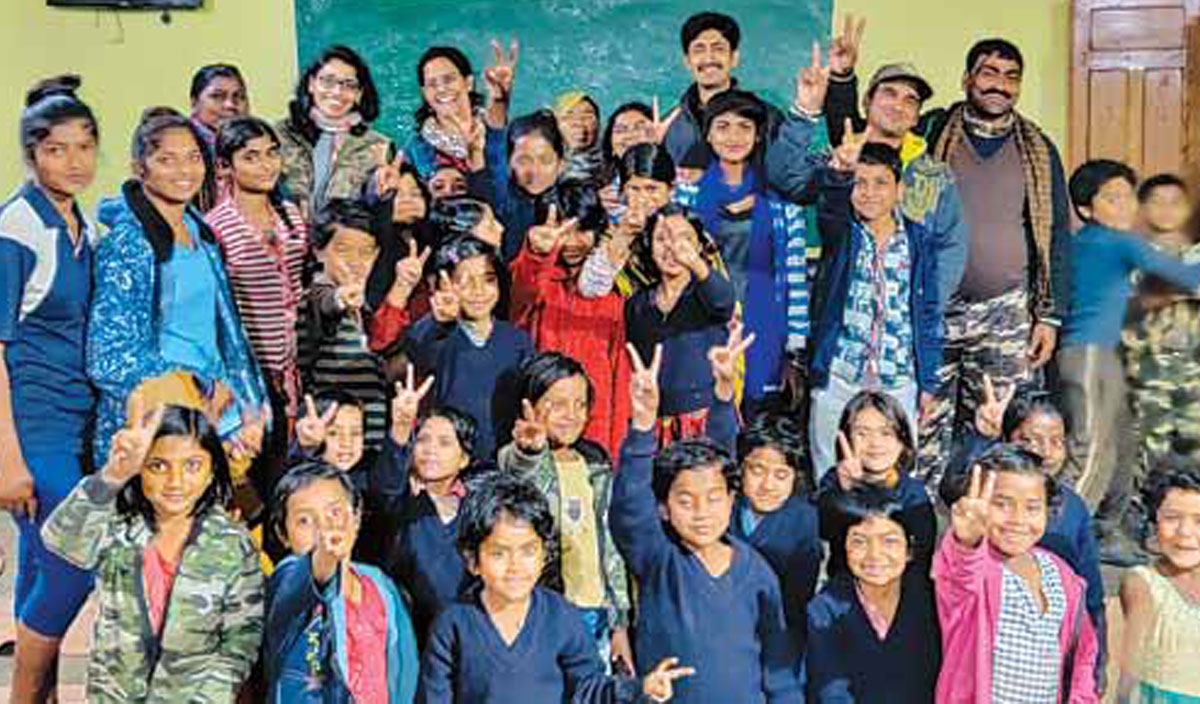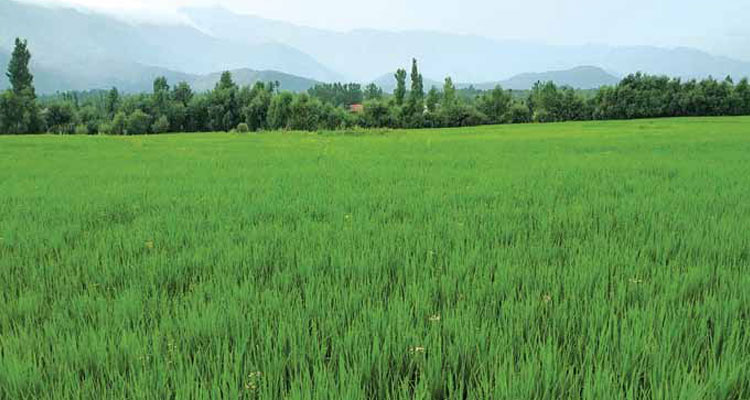
A Green Paddy Field in South of Kashmir
By : Rayies Altaf
No Rice, Eat Apples: Kashmir’s Food Security is at Stake due to Climate Change
Rayies Altaf is a researcher and freelance science writer. He holds a Master’s in Science Communication and M.Phil in Science Policy from Jawaharlal Nehru University. His areas of interest include science-society interaction, scientific research, ecology, environment and sustainability. He has also covered Indian scientific research for Indian Science Wire in the past. He recently finished his fellowship at TERI-New Delhi, in Climate Change Communication in the Himalayas-2020.
His writings and columns on science, technology and environment have featured in both regional and national print media. He has also worked with the Indian Institute of Mass Communication, New Delhi, and Ambedkar University, New Delhi. Rayies is the recipient of two foreign fellowships. He was one among the five Non-European candidates selected for another prestigious fellowship, Erice School of Science Journalism & Communication 2020. He spends his leisure time reading philosophy, fiction and newspaper columns in International dailies.
The photo-story depicts changing patterns of agricultural practices in South Kashmir, as a result of climate change. Due to changing climatic conditions, snowfall patterns have changed. Winters for most part run dry. The problem gets more convoluted with long dry spells, during the months of May-June, when it is paddy sowing season in Kashmir.
Such changes have forced a trend, where farmers are shifting towards dry-land orchard farming. The shifts as a result of these changes are happening at three major levels. One where agricultural fields meant for paddy cultivation are converted into Apple orchards, Second, where old or traditional orchards which were mostly rainfed and had local varieties of fruits, are cut and replaced by modern orchards by planting hybrid apple varieties. There is also an increasing trend where borewells and tube wells are being dug and used for irrigation purposes in these new orchards. Drip irrigation is now being taken up because it saves lot of water from getting wasted.
According to some estimates Kashmir is set to lose all of its paddy land in the next 25 years and by 2040 there will be no land available to cultivate rice. According to the data of state department of agriculture the land under paddy cultivation in Kashmir region has shrunk by 8000 hectares between 2015 and 2018. Kashmir has already lost most of its rice production pushing food deficit to all time high of about 81 percent.
Here is a photo-feature depicting the turns, twists and shifts; agricultural practice in the Kashmir Valley is undergoing.
During the initial stage when paddy saplings are sown in Kashmir during the months of May-June, they need continuous and sustained water supply. A paddy sapling when shifted from nursery to actual field needs a sustained water supply for about one month.
This water comes from two sources rainfall and streams/small irrigation channels which are fed by streams and rivulets. Lately trend has changed where there has been shortage of water in local streams during the months of May-June when the water is needed most and also rainfall is scanty during this time period of the year. This has forced local farmers to shift to other agricultural practices that require less water during that period.
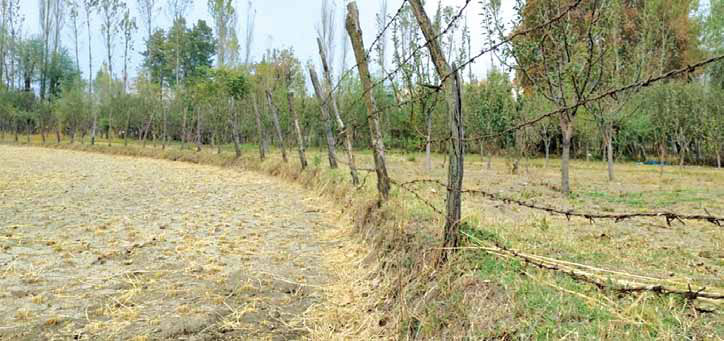
Changing Landscapes: A Barbed Wire Separates Paddy Field from an Orchard.
Here in this a picture, neighbouring farmer in Doru Anantnag in South Kashmir has converted his paddy field into an Orchard, whereas its adjacent land is still a Paddy Field only. According an estimate land under paddy cultivation has shrunk by 8000 hectares between 2015 and 2018 in Kashmir Valley. Large fields of paddy are gradually turning into orchards in Baramulla, Kupwara, Pulwama and Anantnag districts of Kashmir
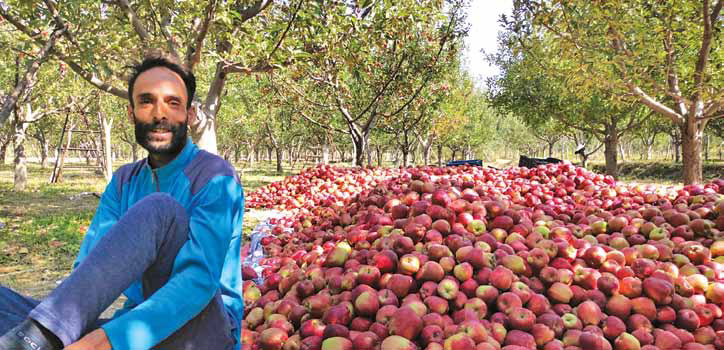
Fayaz Mir, an Orchadist of Kraalmad village in South Kashmir
Fayaz Mir was a paddy cultivator in the past. But due to insufficient water availability during the months of May-June and also low productivity, he decided to convert his Paddy land into an Apple Orchard. It is now 15 years since he is cultivating apples and he says that Paddy was more labour intensive while growing fruit brings more money.
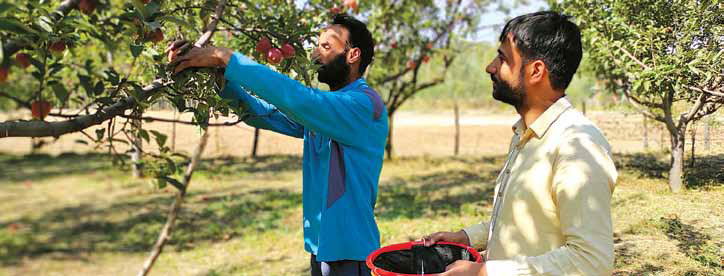
Fayaz Mir with a labourer picking the Apple fruit from the orchard in the month of October 2020 .
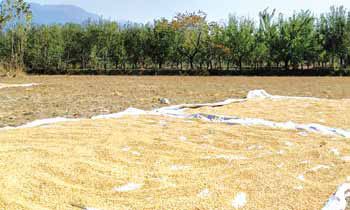
Paddy harvest being dried-up in a Paddy field which is adjacent to the Fayaz Mir’s Apple Orchard. Mir’s orchard is visible on the other side.
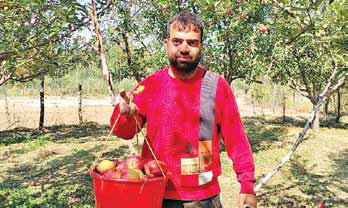
A local labourer in an Apple orchard in south-Kashmir with a bucket of Apples.

Apple Harvest after they are picked
J&K is the largest appleproducing State in India, accounting for more than 71% of the national production.
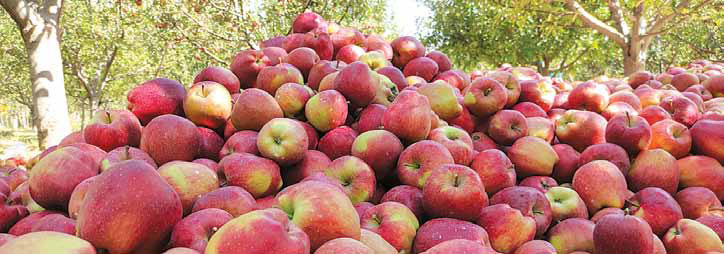
Apple harvest being piled-up before they are sorted, packed in fruit boxes and then moved to cold stores or directly headed to fruit mandis
Warning Signs….!!! Agricultural experts also warn that with the fast-spreading of foreign varieties (e.g. European varieties of apples), the apple’s local flavour and colour may end, for all times to come. The impact is already being felt on the ground. The well-known Kashmiri varieties such as Ambri, Red Delicious, Mahraji are vanishing from the market.
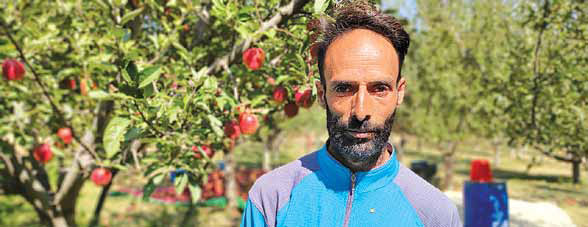
Fayaz Mir’s Orchard is surrounded by Paddy Fields. He is seen in one of those paddy fields which surround his orchard
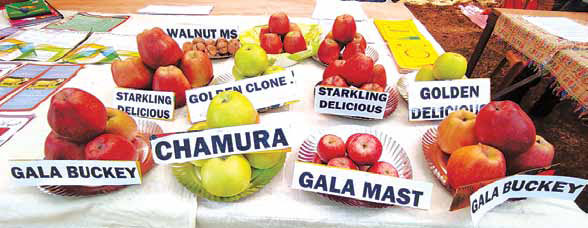
Different varieties of Apples which are grown in Southkashmir
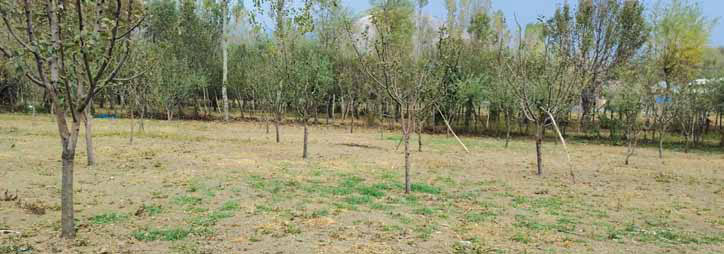
A Paddy Field converted into an Orchard
The large-scale switching from paddy to apple involves a shift from water-intensive paddy crop to dry land orchard farming. “No doubt apple produce is commercially more viable than rice cultivation but how sustainable it would be in the long run, is a big question mark. The fact that paddy fields which during the sowing of paddy remain water logged for more than two months and have a typical soil type, could lead to root rot of apple plantation after few years. Due to this mad rush of turning paddy land into apple orchards, the state’s food security is also being threatened. Besides there are other ecological and environmental concerns such as with increase in Apple farming pesticide use would increase sharply across the valley. Health hazards resulting from residual effects of pesticides and plant bioregulators applied to improve production vis-à-vis fruit quality would have far reaching social implications in the future”, says Prof Raihana Habib Kanth, Chief ScientistAgronomy, Sher-i-Kashmir University of Agricultural Sciences & Technology (SKUAST) -Kashmir

A barbed wire separates an orchard from a paddy field
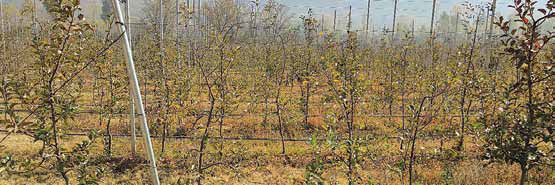
A view of high density orchard with high yielding hybrid Apple plants in Lisser village of SouthKashmir built four years ago, which is equipped with drip irrigation facility
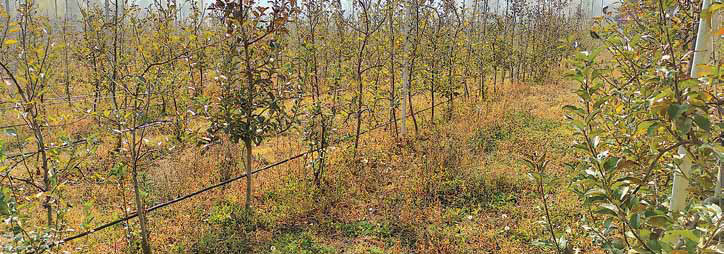
A new trend has taken-off in south Kashmir where old traditional mix type orchards which were mostly rainfed, are being converted into high density hybrid apple orchards and equipped with drip irrigation. In each of these orchards big borewells are dug which ensure irrigation at peak fruiting seasons.
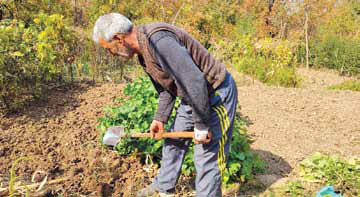
Altaf Hussain, 62, working in his orchard. He owns around 12 kanals of traditional orchard which has mostly traditional pear trees and is rainfed. He now plans to modernise his orchard by uprooting large and well-nursed traditional fruit trees and replace them with high-density, high-yielding, foreign variety apple plantation.
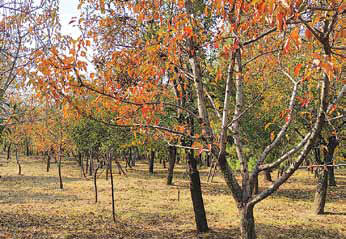
Traditional orchard of Altaf Hussain, which has mixed trees such as Pears, Peaches, Plums & Walnuts .
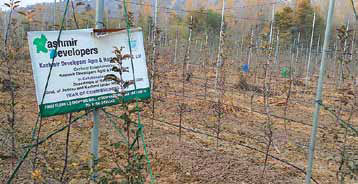
Newly built High-Density Apple Orchard from Agricultural Land/ Paddy Field in South Kashmir .
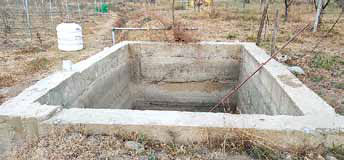
A Borewell in one of the modern hybrid apple orchard.
These borewells act as constant source of drip irrigation of these hybrid high-density apple orchards.
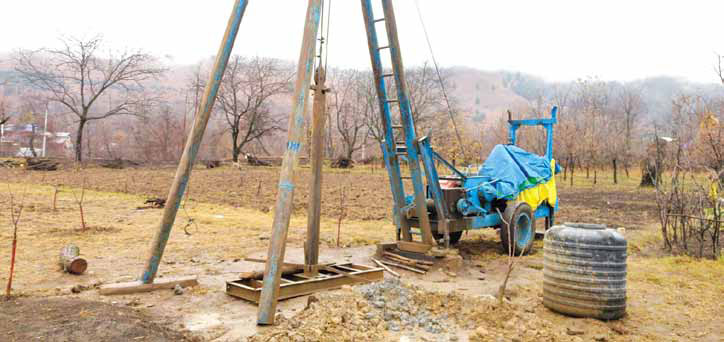
A New Tube well Being Dug for the Upcoming High-Density Apple Orchard in Doru area of South-kashmir
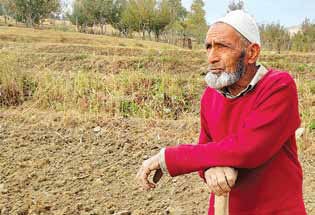
Muhammad Munawar Wani, 75, a local paddy cultivator is still resisting this urge of shifting to orchard/apple farming. He says almost every land around his paddy fields has been turned/changed into an orchard. He is having hard time sustaining his paddy field amidst the upcoming orchard plots. According to him it is just a matter of time that he will say bye bye to paddy cultivation. Mr Munawar is averse to the idea of converting paddy land into orchards or other commercial crops. He says this trend is stealing us of our food self-sufficiency and in near future we will be completely dependent on rice imports. For him it is economic greed mixed with people’s laziness that is responsible for this. Rice cultivation demands a little harder labour and care and new generation is not willing to do that. People want short term gains. The decrease in paddy cultivation would have a long-term impact on the supply chain of rice, since rice is staple food of Kashmiris.
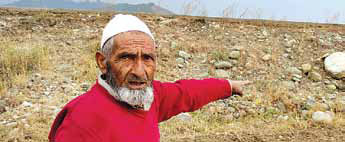
Munawar Wani pointing towards the road which was built over his agricultural land by the government few years back.
The other reason according to Mr Munawar is rapid urbanization. Increased urbanization is leading to new roads and buildings being built over the agricultural land.
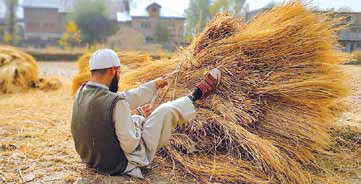
A local farmer in South Kashmir tying the straw left after threshing of the Paddy. The straw serves as dry forage for milch and meat animals.

Fayaz Ahmad, 40, a local farmer in Doru Shahabad, who turned his paddy fields into an orchard few years ago.
For Fayaz, it were long dry spells in the past, particularly during the sowing season that forced small farmers here, to explore an alternative and apple farming came as a handy way of dealing with water stress. Now those who are having their produce from these newly built orchards have realised that it is economically more profitable than that of paddy.
Fayaz says “Apple produce from a small orchard would give you more money than that given by a paddy field of the same size. This is becoming the dominant reason for the trend, where you see more and more people shifting from paddy cultivation to apple farming.”
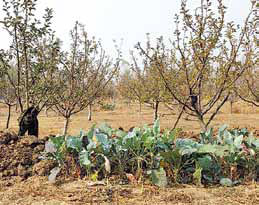
Apple Orchard of Fayaz Ahmad.
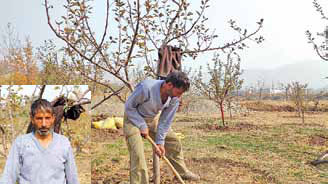
Muhammad Iqbal Rather, 42, whose land is adjacent to that of Fayaz Ahmad has also turned his paddy field into Apple orchard.
Mohammad Iqbal Rather says that he shifted to apple farming because everyone around his land turned their paddy fields into apple farms. He also says that compared to paddy, it is easier to grow apple.
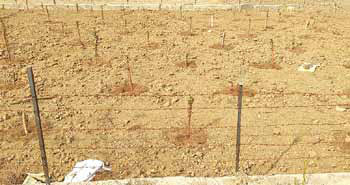
Apple saplings/rootstocks have been planted in a paddy field in Doru town of South- Kashmir to convert it into an Orchard.
(Disclaimer: This photo-feature was produced as a part of TERI Fellowship on Climate Change Communication in the Himalayas-2020)

